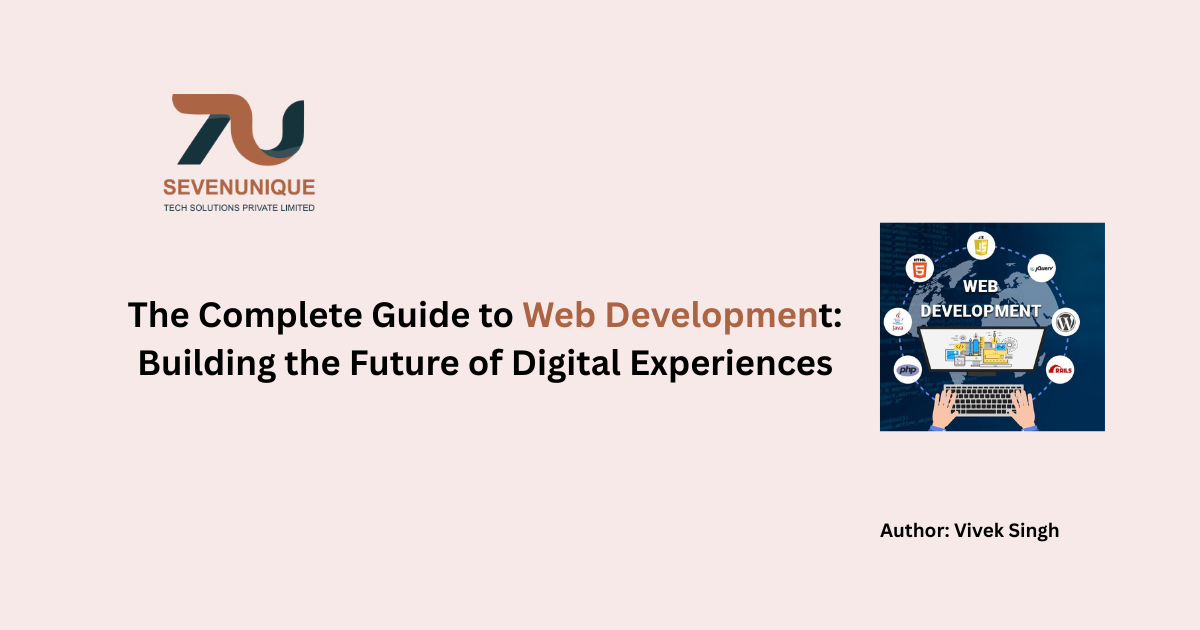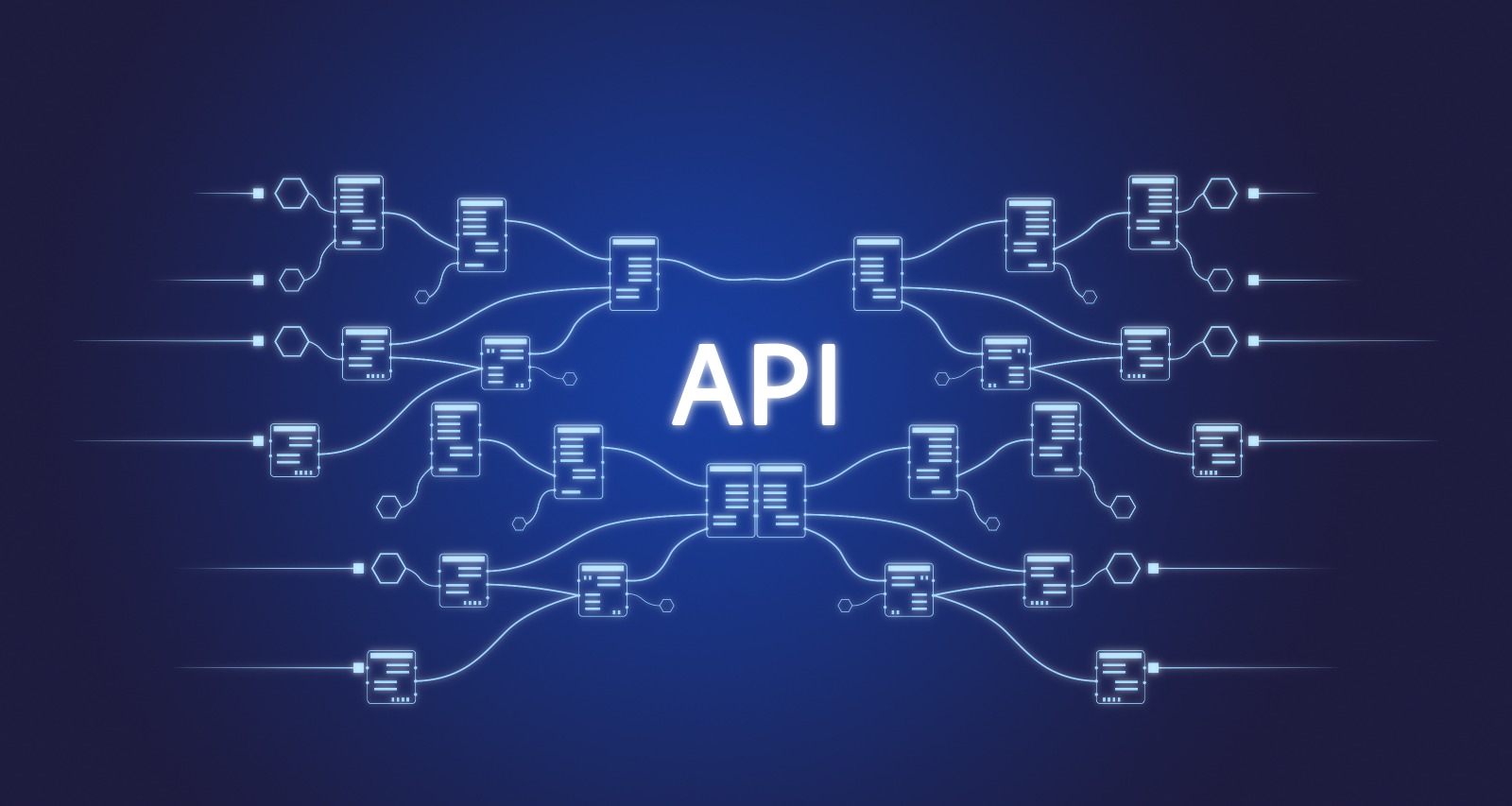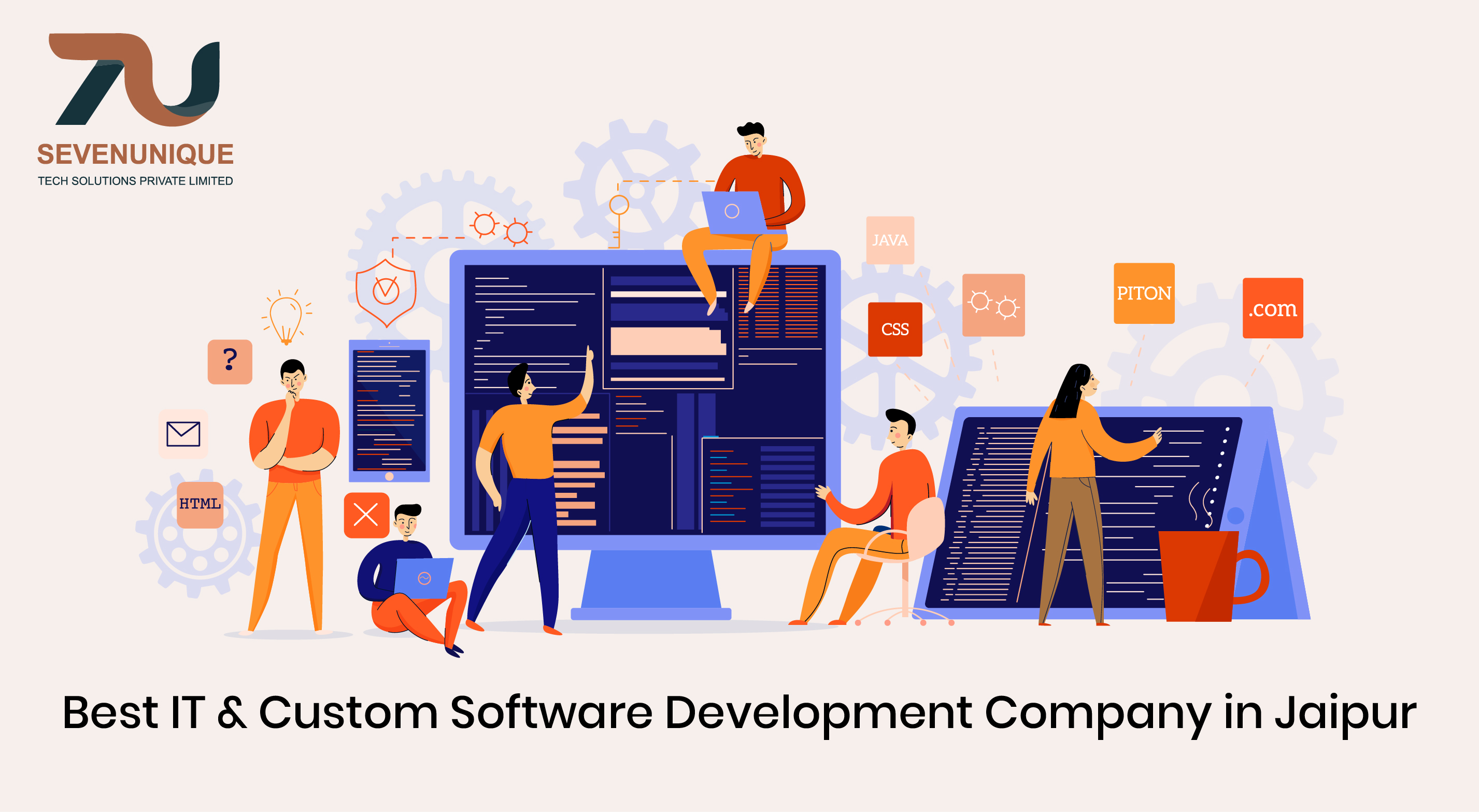The Complete Guide to Web Development: Building the Future of Digital Experiences
Author: Vivek Singh
Table of Contents
|
1. Introduction to Web Development
Web development has become the foundation of the digital economy, connecting businesses and users across the globe. Every business, from local startups to multinational corporations, relies on websites to engage customers, showcase services, and process transactions. Modern web development is a blend of creativity, technical skills, and strategic planning to deliver seamless online experiences. In India, cities like Jaipur have witnessed a rapid rise in demand for affordable web development services, enabling small businesses to compete effectively on both national and international levels. A well-developed website enhances credibility, builds trust, and supports marketing campaigns by providing a reliable digital presence. Web development also encompasses aspects like performance optimisation, security, and scalability, ensuring that websites can handle high traffic, secure sensitive data, and grow alongside the business. With mobile internet penetration rising, responsive websites that provide a consistent experience on desktops, tablets, and smartphones have become essential. Investing in professional web development not only helps businesses survive in a digital-first world but also provides opportunities for expansion, brand building, and long-term growth.
2. Evolution of Modern Websites
The evolution of websites over the last three decades has been remarkable. Early websites of the 1990s were static, informational pages built purely with HTML, offering limited interactivity. The introduction of CSS and JavaScript enhanced visual appeal and usability, allowing designers to create more engaging interfaces. Content management systems like WordPress revolutionised web development, enabling businesses to manage content efficiently without extensive coding knowledge. Today, modern frameworks such as React, Angular, and Vue.js enable developers to build dynamic, responsive, and scalable websites capable of handling e-commerce transactions, educational platforms, booking systems, and enterprise solutions. The transition from simple web pages to complex applications reflects not only technological advancement but also a shift in business strategies. Companies now prioritise user experience, performance, and SEO optimisation, integrating tools and features that support analytics, marketing, and customer interaction. This evolution has led to the rise of professional web development services in India, offering solutions that are cost-effective yet highly functional. Businesses now view websites as integral parts of their digital strategy, essential for brand building, customer engagement, and long-term growth in competitive markets.
3. Importance of Web Development for Businesses
In today’s digital-first economy, a website is often the first point of contact between a business and its customers. A strong online presence enhances credibility, builds trust, and improves conversion rates by providing users with a professional and reliable platform. Customers increasingly rely on websites to understand products, compare services, and make informed decisions. For small and medium enterprises in India, professional web development services provide cost-effective solutions that allow them to compete with larger players. A responsive website with fast loading speeds, intuitive navigation, and optimized content ensures higher engagement, better user retention, and stronger brand perception. Additionally, well-developed websites integrate seamlessly with digital marketing campaigns, including SEO, social media, and email marketing, to increase visibility and reach. Businesses that invest in professional web development also benefit from analytics tools that track user behavior, helping optimize services and improve overall performance. A strategically designed website not only attracts customers but also fosters loyalty, builds reputation, and enables scalable growth in a competitive global marketplace.
4. Front-End Development: Crafting the User Experience
Front-end development is the visual and interactive layer of a website, determining how users perceive and interact with it. Technologies such as HTML, CSS, and JavaScript provide the foundation for structure, design, and functionality, while frameworks like React and Angular streamline the creation of responsive and interactive websites. Front-end developers focus on crafting intuitive navigation, engaging visuals, and smooth interactions that enhance user satisfaction. Performance optimization, accessibility, and mobile responsiveness are crucial aspects of front-end development, ensuring that websites function flawlessly across devices. User-friendly design reduces bounce rates, increases session duration, and encourages users to take desired actions such as purchasing products, signing up for services, or submitting inquiries. Professional web development services emphasize a balance between aesthetics and functionality, ensuring that every website is visually appealing yet optimized for performance and search engine visibility. In India, businesses are increasingly investing in advanced front-end solutions to improve customer experience, enhance brand perception, and stay competitive in an ever-evolving digital landscape.
5. Back-End Development: The Power Behind Websites
While the front-end handles user interaction, the back-end powers the logic, database operations, and server-side functionalities that keep websites running smoothly. Technologies like PHP, Node.js, Python, and Java are widely used to develop robust, secure, and scalable back-end systems. Back-end development ensures that features like user authentication, payment processing, data retrieval, and API integrations function efficiently. A strong back-end is critical for businesses that offer e-commerce platforms, educational portals, booking systems, or on-demand services, as it supports secure transactions, real-time updates, and high-volume data processing. Security measures, such as encryption and secure database management, protect sensitive customer information from breaches. Companies providing professional web development services in India focus on creating back-end systems that are flexible, scalable, and maintainable, allowing businesses to adapt to changing requirements and traffic growth. An efficient back-end complements a well-designed front-end, resulting in websites that are not only visually engaging but also reliable, fast, and secure, enhancing overall user experience and supporting business objectives.
6. Role of Databases in Web Applications
Databases are the backbone of modern web applications, storing, managing, and retrieving large volumes of information. Technologies like MySQL, MongoDB, and PostgreSQL are widely used to handle data efficiently. For e-commerce platforms, databases manage thousands of products, inventory, customer orders, and payment details. Educational portals store student profiles, course content, and performance metrics, while service-based platforms track bookings, user activity, and notifications. Efficient database design is essential for performance, scalability, and reliability, ensuring that websites respond quickly even under heavy traffic. Security is another critical aspect, as poorly managed databases can lead to data breaches and loss of sensitive information. Professional web development services emphasise secure and optimised database management, enabling websites to handle complex operations without compromising speed or safety. A well-structured database not only supports functionality but also enhances user experience, allowing businesses to provide real-time updates, personalised content, and reliable services across industries.
7. E-Commerce and Educational Platforms
E-commerce and educational websites have transformed the way people shop and learn. E-commerce platforms require smooth navigation, effective product showcasing, and secure payment gateways to ensure a seamless shopping experience. In India, affordable web development solutions allow startups and small businesses to establish online stores that rival large retailers in performance and usability. Educational platforms demand features like interactive dashboards, video streaming, live classes, and progress tracking to create engaging learning experiences. Professional web developers focus on combining technical functionality with user-centric design to build scalable platforms for both industries. Businesses investing in well-designed e-commerce or educational websites benefit from increased reach, customer retention, and operational efficiency. Additionally, integrating analytics, SEO optimisation, and mobile responsiveness enhances discoverability and accessibility, ensuring long-term growth and success in competitive markets.
8. On-Demand Web Applications and Emerging Trends
On-demand web applications, such as cab booking, food delivery, healthcare, and home services, rely on real-time functionality, API integration, and scalable infrastructure. Developing such platforms requires expertise in server management, database handling, and user interface design to provide seamless experiences. Emerging trends like AI integration, Progressive Web Apps, voice search optimisation, and blockchain technology are reshaping the web development landscape. AI-powered chatbots improve customer support efficiency, while blockchain ensures secure transactions. Progressive Web Apps offer app-like experiences on browsers, and voice search optimisation caters to the growing use of smart devices. Companies offering professional web development services stay updated with these trends, enabling businesses to implement innovative solutions that enhance user experience, improve efficiency, and maintain competitiveness in a rapidly evolving digital market.
9. Choosing the Right Technology Stack for Growth
Selecting the right technology stack is crucial for developing websites that are scalable, cost-effective, and future-ready. The choice of programming languages, frameworks, servers, and databases impacts the performance, security, and maintainability of a web application. Small businesses in India often prefer PHP, WordPress, and MySQL for affordability and ease of use, while larger enterprises may opt for Node.js, React, and cloud-based servers for scalability and speed. Professional web development services analyse client requirements, budget constraints, and growth potential before recommending the ideal stack. A thoughtfully chosen technology stack ensures that websites can handle high traffic, integrate with third-party tools, and adapt to evolving business needs. Investing in the right stack not only improves efficiency but also reduces long-term maintenance costs and supports the business’s digital growth strategy, providing a competitive edge in the global market.
Conclusion
Web development is no longer just about creating a website; it is about crafting digital experiences that drive engagement, trust, and growth. From small businesses to large enterprises, a professionally developed website is a strategic asset that supports marketing, operations, and customer interaction. In India, affordable and high-quality web development services enable companies to compete globally while addressing local market needs. By embracing modern technologies, emerging trends, and responsive design, businesses can build platforms that are scalable, secure, and user-friendly. Choosing the right development partner and technology stack ensures long-term success, enabling companies to stay ahead in an increasingly competitive digital landscape. A strategic investment in web development transforms websites into powerful tools for growth, brand building, and customer engagement, shaping the future of digital experiences.


.png)




.jpg)
.jpg)


